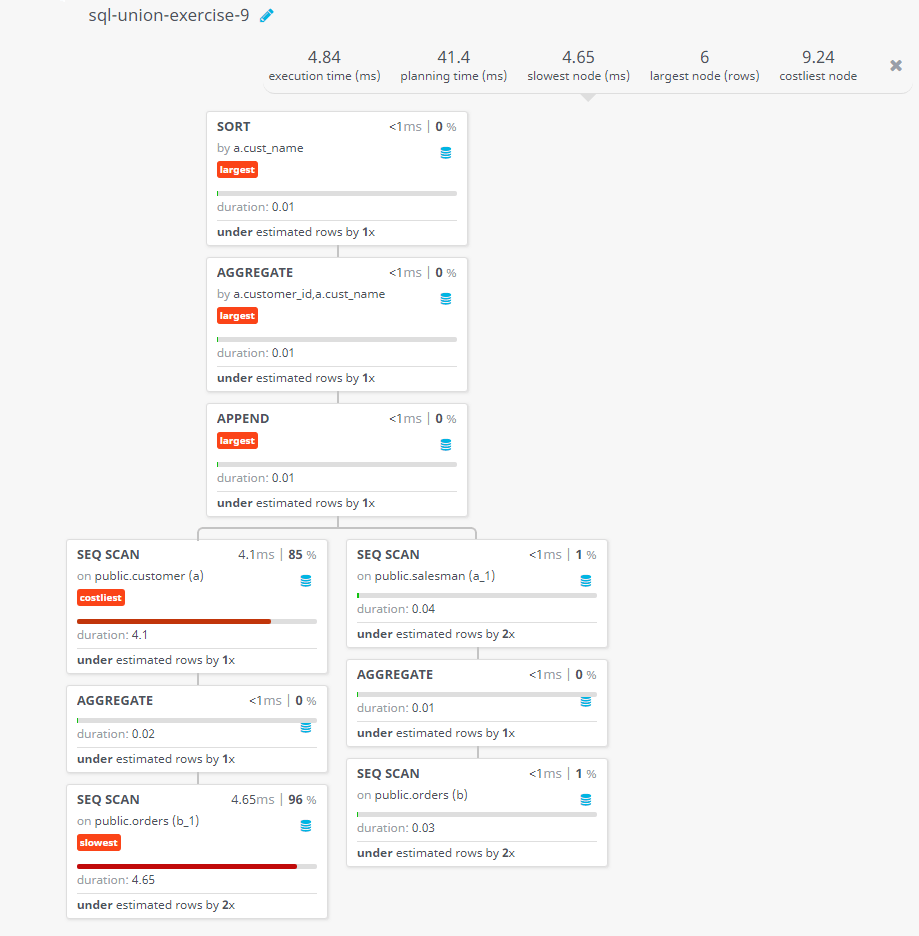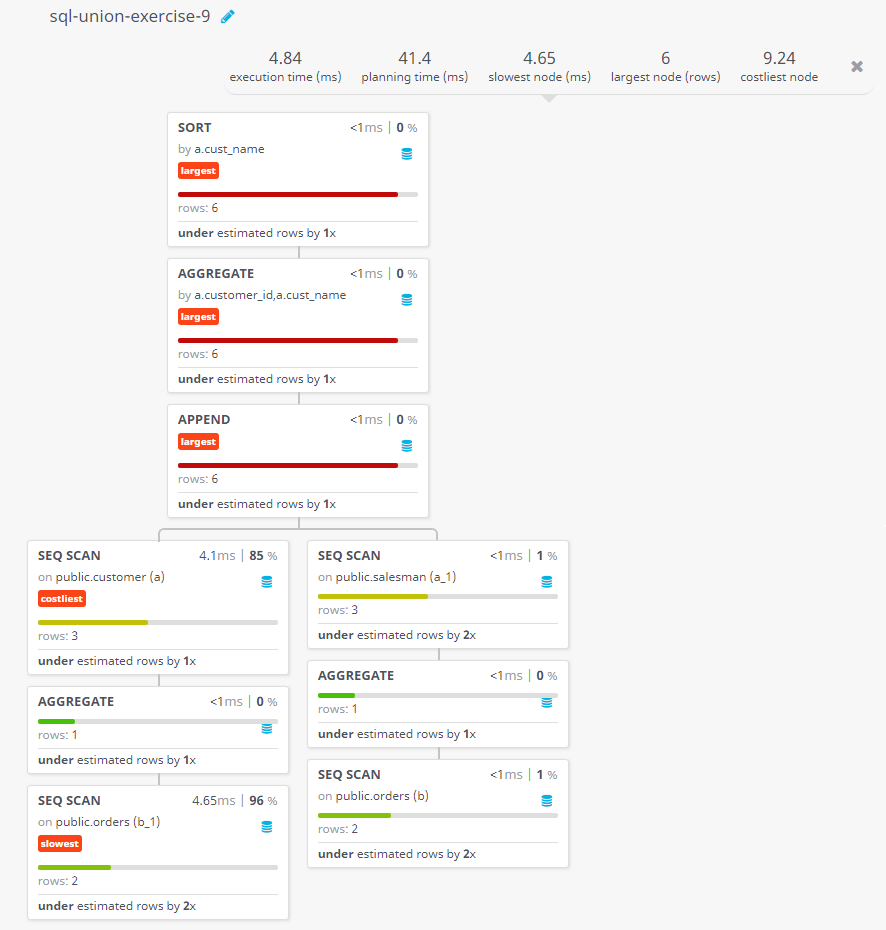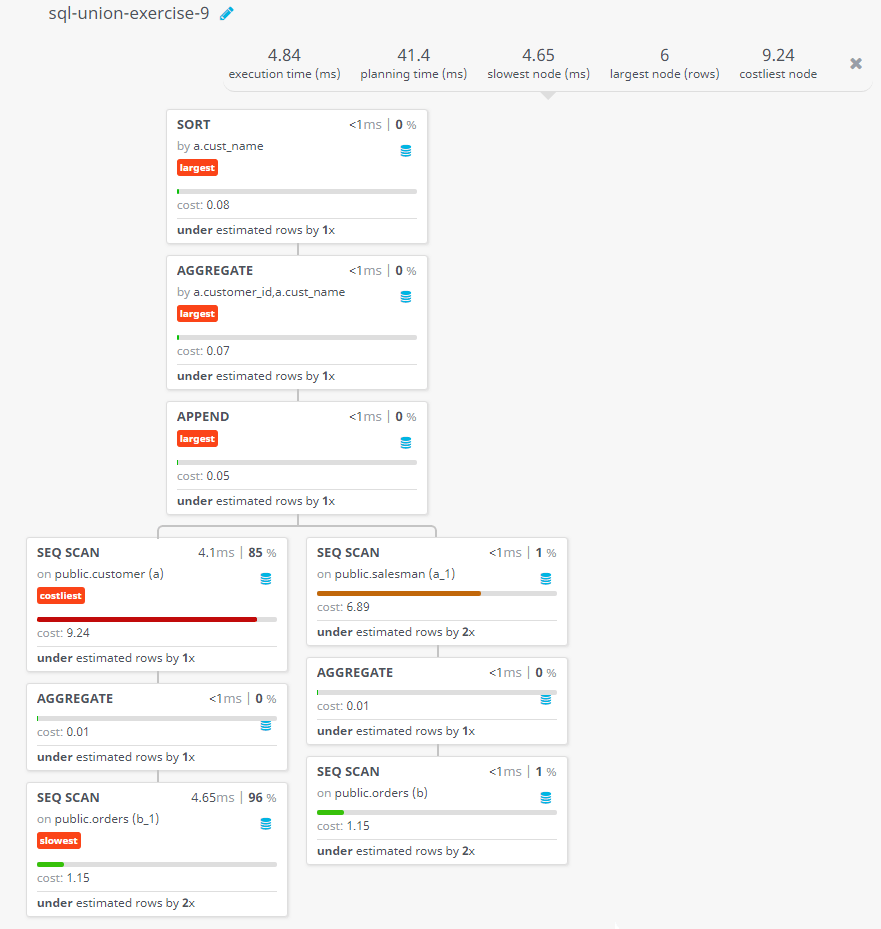SQL Exercises: Customer with more than one current order
9. From the following table, write a SQL query to find those salespersons and customers who have placed more than one order. Return ID, name.
Sample table: Customer
customer_id | cust_name | city | grade | salesman_id
-------------+----------------+------------+-------+-------------
3002 | Nick Rimando | New York | 100 | 5001
3007 | Brad Davis | New York | 200 | 5001
3005 | Graham Zusi | California | 200 | 5002
3008 | Julian Green | London | 300 | 5002
3004 | Fabian Johnson | Paris | 300 | 5006
3009 | Geoff Cameron | Berlin | 100 | 5003
3003 | Jozy Altidor | Moscow | 200 | 5007
3001 | Brad Guzan | London | | 5005
Sample table: Salesman
salesman_id | name | city | commission
-------------+------------+----------+------------
5001 | James Hoog | New York | 0.15
5002 | Nail Knite | Paris | 0.13
5005 | Pit Alex | London | 0.11
5006 | Mc Lyon | Paris | 0.14
5007 | Paul Adam | Rome | 0.13
5003 | Lauson Hen | San Jose | 0.12
Sample table: orders
ord_no purch_amt ord_date customer_id salesman_id ---------- ---------- ---------- ----------- ----------- 70001 150.5 2012-10-05 3005 5002 70009 270.65 2012-09-10 3001 5005 70002 65.26 2012-10-05 3002 5001 70004 110.5 2012-08-17 3009 5003 70007 948.5 2012-09-10 3005 5002 70005 2400.6 2012-07-27 3007 5001 70008 5760 2012-09-10 3002 5001 70010 1983.43 2012-10-10 3004 5006 70003 2480.4 2012-10-10 3009 5003 70012 250.45 2012-06-27 3008 5002 70011 75.29 2012-08-17 3003 5007 70013 3045.6 2012-04-25 3002 5001
Sample Solution:
-- Selecting specific columns (customer_id as "ID", cust_name as "NAME") from the 'customer' table (aliased as 'a')
SELECT customer_id as "ID", cust_name as "NAME"
-- Filtering rows in the 'customer' table (aliased as 'a') where the count of associated orders is greater than 1
FROM customer a
WHERE 1 <
(SELECT COUNT(*)
FROM orders b
WHERE a.customer_id = b.customer_id)
-- Performing a UNION operation with the result set of a subquery
UNION
-- Selecting specific columns (salesman_id as "ID", name as "NAME") from the 'salesman' table (aliased as 'a')
SELECT salesman_id as "ID", name as "NAME"
-- Filtering rows in the 'salesman' table (aliased as 'a') where the count of associated orders is greater than 1
FROM salesman a
WHERE 1 <
(SELECT COUNT(*)
FROM orders b
WHERE a.salesman_id = b.salesman_id)
-- Ordering the result set based on the second column ("NAME")
ORDER BY 2
Sample Output:
ID NAME 3009 Geoff Cameron 3005 Graham Zusi 5001 James Hoog 5003 Lauson Hen 5002 Nail Knite 3002 Nick Rimando
Code Explanation:
The said query in SQL which selects customer_id and cust_name columns from the customer table and renames them as "ID" and "NAME" respectively.
The subquery checks whether at least one order placed by each customer or not. If the count of orders for a customer is greater than 1, then that customer is included in the results.
The UNION operator is used to combine the results of this query with another query that selects salesman_id and name columns from the salesman table, renames them as "ID" and "NAME" respectively, and checks if there is at least one order placed by each salesman. The final result is then ordered by the "NAME" column.
Go to:
PREV : Ratings of all customers with a comment string.
NEXT : SQL VIEW Exercises Home
Practice Online
Query Visualization:
Duration:
Rows:
Cost:
Have another way to solve this solution? Contribute your code (and comments) through Disqus.
What is the difficulty level of this exercise?
Test your Programming skills with w3resource's quiz.




